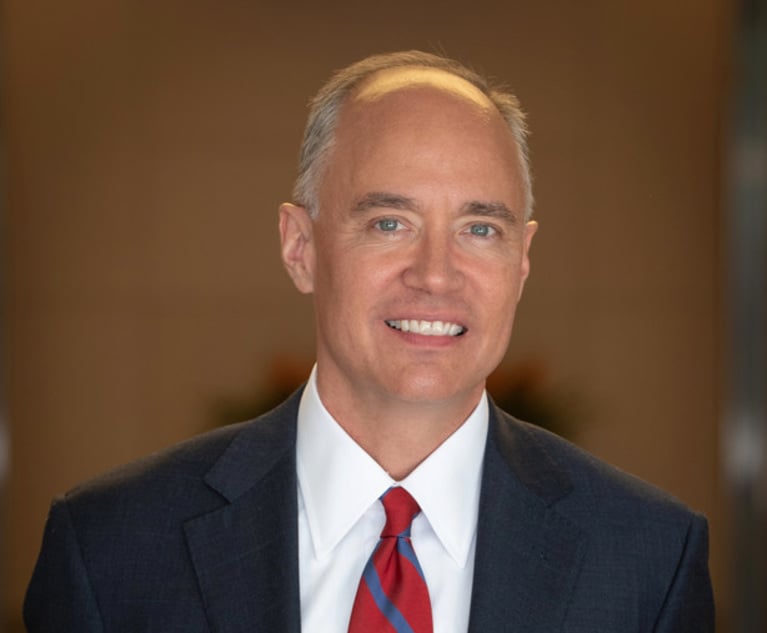Former Conn's In-House Lawyer Booted From Case 'Substantially Related' to Her Old Job
But the Houston judge turned down a sanctions request, finding no evidence of bad faith on the former GC's part.
July 11, 2019 at 04:27 PM
3 minute read
The original version of this story was published on Corporate Counsel

Retailer Conn's Appliances Inc. has won a battle to have its former senior legal counsel barred from representing a plaintiff now suing the company on causes of action similar to those that the in-house attorney defended during her time there. Conn's bid to have the lawyer sanctioned for filing the lawsuit failed, however.
Judge Vanessa Gilmore of the U.S. District Court for the Southern District of Texas in Houston found that the Telephone Consumer Protection Act and Texas Debt Collection Act claims that Trista Johnson brought against Conn's in May for a client are “substantially related” to the work she did while serving as Conn's No. 2 in-house lawyer from December 2016 to February 2018.
The judge concluded that relationship precludes Johnson's representation of her client under local, state and national professional conduct rules.
Johnson unsuccessfully argued she did not spend the bulk of her day-to-day work managing TCPA and TCDA claims but leaned heavily on outside counsel and in-house paralegals to manage cases against the Woodlands, Texas-based seller of furniture, mattresses, home appliances and consumer electronics.
She said she attended only three arbitration hearings and one settlement conference and any knowledge of the company's approach to litigating claims under the laws was public information and thus not secret.
Gilmore also rejected Johnson's claim that the matters are not “substantially related” because her client is a new one and factually distinct from cases Johnson handled on behalf of Conn's.
“There is no dispute that Johnson managed TDCA and TCPA claims for [Conn's] and that Johnson's current client has raised TDCA and TCPA claims,” the judge wrote. “The claims Johnson managed for [Conn's] involved the same factual allegations about [Conn's] use of an automatic telephone dialing system to repeatedly call consumers without their consent.”
She continued: “Anytime a lawyer represents a new client, there are factual differences because the client has a different identity and subjective viewpoint of the facts. The relevant [disciplinary] rules focus not on the identity of the client, but on the similarity between the subject matter of the current and former representations.”
Gilmore accepted Conn's argument that Johnson's knowledge of specific facts—related to Conn's use of the automatic telephone dialing system, arbitration strategy for defending TCPA claims, and her organization and participation in a corporate witness training system on Conn's telephony equipment—precluded her representation in the new case. But the judge found that Conn's provided no evidence of bad faith sufficient to warrant sanctions.
“Johnson put forth reasonable and compelling arguments for why she believed she could represent” her new client, Gilmore wrote.
Conn's attorney, Michael Harvey of Munsch Hardt Kopf & Harr in Houston, said, ''We are pleased that the Court agreed that Ms. Johnson's actions violated the ethical principle of client loyalty and warranted the harsh and rare result of attorney disqualification.”
In an emailed statement reflecting her pleasure with denial of the sanctions motion, Johnson, a consumer protection solo practitioner in Conroe, Texas, said: “While my client and I knew this was a potential outcome, we are still disappointed in the court's decision. I believed I was on solid footing given the applicable rules and case law analyzing other disqualification motions, and that Conn's motion misstated the facts and applicable standards.”
|This content has been archived. It is available through our partners, LexisNexis® and Bloomberg Law.
To view this content, please continue to their sites.
Not a Lexis Subscriber?
Subscribe Now
Not a Bloomberg Law Subscriber?
Subscribe Now
NOT FOR REPRINT
© 2024 ALM Global, LLC, All Rights Reserved. Request academic re-use from www.copyright.com. All other uses, submit a request to [email protected]. For more information visit Asset & Logo Licensing.
You Might Like
View All
Revisiting the Boundaries Between Proper and Improper Argument: 10 Years Later
8 minute read
'Serious Disruptions'?: Federal Courts Brace for Government Shutdown Threat
3 minute read
Uber Not Responsible for Turning Over Information on 'Dangerous Riders' to Competitor, Judge Finds
5 minute read
Infant Formula Judge Sanctions Kirkland's Jim Hurst: 'Overtly Crossed the Lines'
4 minute readTrending Stories
- 1Georgia Supreme Court Honoring Troutman Pepper Partner, Former Chief Justice
- 2Insurer Not Required to Cover $29M Wrongful Death Judgment, Appeals Court Rules
- 3Slideshow: Jewish Bar Association of Georgia Marks 1st Year With Hanukkah Party
- 4Holland & Knight Launches Export Control Disputes and Advocacy Team
- 5Blake Lively's claims that movie co-star launched smear campaign gets support in publicist's suit
Who Got The Work
Michael G. Bongiorno, Andrew Scott Dulberg and Elizabeth E. Driscoll from Wilmer Cutler Pickering Hale and Dorr have stepped in to represent Symbotic Inc., an A.I.-enabled technology platform that focuses on increasing supply chain efficiency, and other defendants in a pending shareholder derivative lawsuit. The case, filed Oct. 2 in Massachusetts District Court by the Brown Law Firm on behalf of Stephen Austen, accuses certain officers and directors of misleading investors in regard to Symbotic's potential for margin growth by failing to disclose that the company was not equipped to timely deploy its systems or manage expenses through project delays. The case, assigned to U.S. District Judge Nathaniel M. Gorton, is 1:24-cv-12522, Austen v. Cohen et al.
Who Got The Work
Edmund Polubinski and Marie Killmond of Davis Polk & Wardwell have entered appearances for data platform software development company MongoDB and other defendants in a pending shareholder derivative lawsuit. The action, filed Oct. 7 in New York Southern District Court by the Brown Law Firm, accuses the company's directors and/or officers of falsely expressing confidence in the company’s restructuring of its sales incentive plan and downplaying the severity of decreases in its upfront commitments. The case is 1:24-cv-07594, Roy v. Ittycheria et al.
Who Got The Work
Amy O. Bruchs and Kurt F. Ellison of Michael Best & Friedrich have entered appearances for Epic Systems Corp. in a pending employment discrimination lawsuit. The suit was filed Sept. 7 in Wisconsin Western District Court by Levine Eisberner LLC and Siri & Glimstad on behalf of a project manager who claims that he was wrongfully terminated after applying for a religious exemption to the defendant's COVID-19 vaccine mandate. The case, assigned to U.S. Magistrate Judge Anita Marie Boor, is 3:24-cv-00630, Secker, Nathan v. Epic Systems Corporation.
Who Got The Work
David X. Sullivan, Thomas J. Finn and Gregory A. Hall from McCarter & English have entered appearances for Sunrun Installation Services in a pending civil rights lawsuit. The complaint was filed Sept. 4 in Connecticut District Court by attorney Robert M. Berke on behalf of former employee George Edward Steins, who was arrested and charged with employing an unregistered home improvement salesperson. The complaint alleges that had Sunrun informed the Connecticut Department of Consumer Protection that the plaintiff's employment had ended in 2017 and that he no longer held Sunrun's home improvement contractor license, he would not have been hit with charges, which were dismissed in May 2024. The case, assigned to U.S. District Judge Jeffrey A. Meyer, is 3:24-cv-01423, Steins v. Sunrun, Inc. et al.
Who Got The Work
Greenberg Traurig shareholder Joshua L. Raskin has entered an appearance for boohoo.com UK Ltd. in a pending patent infringement lawsuit. The suit, filed Sept. 3 in Texas Eastern District Court by Rozier Hardt McDonough on behalf of Alto Dynamics, asserts five patents related to an online shopping platform. The case, assigned to U.S. District Judge Rodney Gilstrap, is 2:24-cv-00719, Alto Dynamics, LLC v. boohoo.com UK Limited.
Featured Firms
Law Offices of Gary Martin Hays & Associates, P.C.
(470) 294-1674
Law Offices of Mark E. Salomone
(857) 444-6468
Smith & Hassler
(713) 739-1250






